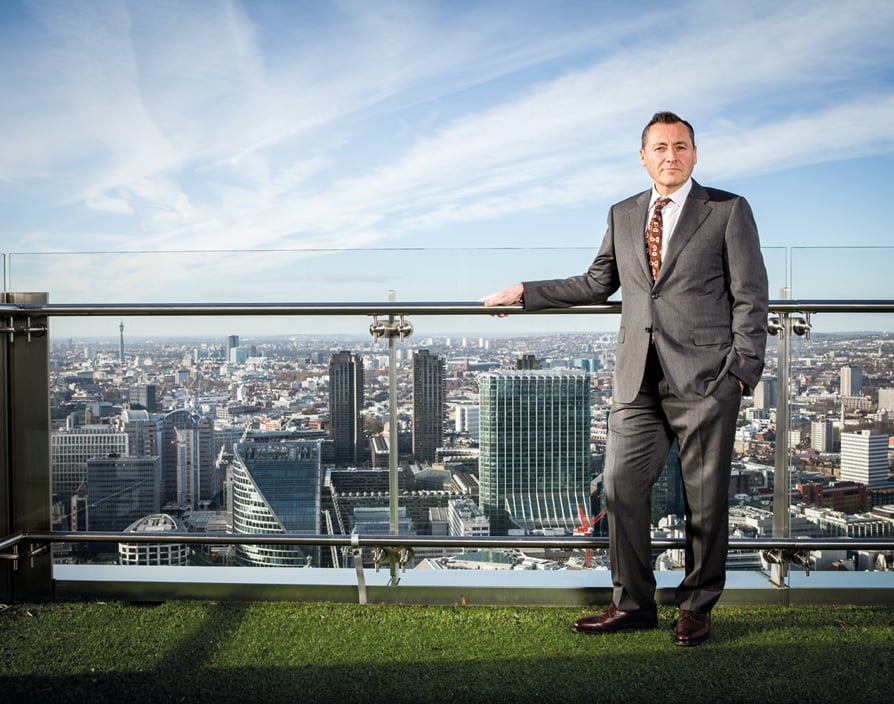His company is currently valued at £1.6bn but it’s evident that Powa Technologies‘ CEO Dan Wagner would rather be known for his products than his market price. He’s certainly far from enamoured with the language surrounding startups that carry such valuations. “I don’t like the term ‘unicorn’. It’s creating the wrong dynamic around businesses,” he says. “Businesses shouldn’t be championed for the fact that they have an X or Y valuation. They should be championed for the fact that they have a great initiative, great products, customers and momentum – all the things that define a business as a success.”
While the headquarters of his e-commerce firm Powa Technologies might inhabit the same postcode area as London’s other billion-dollar startups, Wagner doesn’t associate too closely with his Shoreditch counterparts. “There’s an almost enthusiastic desire to be a unicorn and to be in some club. I don’t want to be in that club. I don’t like being in any club actually. I am the anti-tech entrepreneur in that respect,” he laughs.
Indeed, the Powa offices are a far cry from what most people would expect from a modern tech company, spanning the top two floors of Heron Tower and offering some stunning views of the city. “There are no exposed brick walls, there is no fussball table,” says Wagner. “We are not trying to put ourselves forward as something [we’re not]. We’re a very serious business.”
Yet back in 1984, Wagner was himself a fresh-faced tech entrepreneur with a big idea. His first company MAID (Market Analysis Information Database), which later became Dialog, is widely recognised as the first attempt to package electronic information and make it accessible to anybody with a computer. As Wagner remarks, “That was 1984, five years before Tim Berners-Lee presented the concept of the World Wide Web at CERN and eight years before we started using it.”
Wagner was inspired to launch MAID while working at WCRS (White Collins Rutherford Scott), the London ad agency. Yet, if it wasn’t for an inspired job application, things may have turned out differently for the entrepreneur. Having dropped out of school at 16, Wagner found himself at a disadvantage compared to other candidates. “It was very difficult to get into advertising,” he says. “Back in those days, they had the cream of the graduates putting themselves forward, so I had to do something to stand out from the pack.” Wagner knocked up an advert of himself on a huge piece of poster board and sent it to the chairman of WCRS in a taxi. It landed him a job as a runner on a salary of £2,400, the minimum wage for under-18s at the time. “I was absolutely thrilled,” he smiles.
Wagner’s imagination helped him work his way up the ranks at WCRS. Keen to make a move into account management, he started turning up in a suit. “People were saying ‘Why are you walking around in a suit? Do you want a job in account management?’” says Wagner. He was promptly promoted, which is when the idea for MAID started to emerge. “When we were pitching for advertising, I had to find out about the ice-cream market, the milk market or the market for sports cars,” says Wagner. “In those days, you’d have to go to libraries to get the information – it was quite difficult.”

At a time when computers were a cutting-edge piece of new technology, Wagner envisaged a solution to the problem faced by marketers, not to mention scientists and librarians. While admitting it was “a bit of a punt” – hardly anybody owned a computer in the early 1980s – Wagner ended up floating MAID on the London Stock Exchange in 1994, making him the youngest CEO of a public company in the UK. However, he fell foul of many commentators and industry leaders after sporting a Daffy Duck waistcoat to the media call ahead of the company’s IPO. Wagner believes the hysteria over his choice of attire was just a symptom of general attitudes towards him personally. “There was a feeling of incredulity in 1994 that a 30-year-old could be running a public company,” he says. “Today there are loads of 30-year-olds running public companies and nobody really cares because that’s not what defines an individual and their ability. But back then, it did.”
MAID prospered as dotcom companies proliferated in the mid-1990s – Wagner was invited by Bill Gates to the launch of MSN, to which MAID provided the majority of content – but suffered, like all companies, during the dotcom collapse a few years later. Dialog – as the company was renamed after its acquisition of Knight Ridder in 1997 – was eventually sold to Thomson-Reuters for $500m, shortly before the crisis culminated in March 2000. “It is very possible that, had I not sold Dialog just before the dotcom crash, a lot more value would have been applied to it as a public company [after the crash],” says Wagner. “But that’s the vagaries of the public market.”
Wagner’s attention turned to his second venture Venda, an e-commerce firm that provided cloud software services to retailers; this was ten years before the terms ‘cloud’ and software-as-a-service (SaaS) were officially coined. Venda was built using the remnants of dotcom casualty Boo.com, which Wagner acquired for £250,000 in 2000. “From the outside, Boo.com was a lot of people flying around on Concorde, drinking champagne and spending investors’ money but beneath the surface was a very capable e-commerce team,” he explains. While Wagner initially had trouble convincing people of Venda’s potential, retailers including Tesco and Laura Ashley are now using the platform, which was sold to software giant Netsuite last year.
However, Wagner had stepped down as an executive of Venda in 2010 to push ahead with a new project. His time at Venda had opened his eyes to some of the pitfalls facing retail brands that were looking to offer a seamless multichannel experience. “My engagement with retailers identified a number of things,” he says. “One of the things was the awful disparity between the experience that a consumer has when they go online and when they shop offline with the same retailer. It’s quite a personal experience when you go online but I could go to that same retailer’s store and they’d have no clue who I am. I could be anybody.”
Thus, far from steering consumers towards online retail, Wagner was on a totally different mission: to save the great British high street. “You can have two visions of the high street,” he says. “Vision number one is tumbleweeds and lawlessness: you stay at home and drones deliver everything to you. But there’s another vision of the future and that vision is that you make the high street relevant again.”
Suffice to say, there was a device that sat squarely at the forefront of Wagner’s vision. “If you look at a millennial, they sit looking at their mobile phone all day, even when they are in physical stores,” he explains. “They are not engaged with the things around them in the way that they are engaged with their mobile device. That’s the problem I wanted to solve.”
The first products out of the Powa Technologies stable were mPowa – now PowaPoS – which offers a mobile payment solution to retailers, and PowaWeb, a cloud-based e-commerce platform similar to Venda. However, it’s the third member of Powa’s portfolio that Wagner is hanging everything – including his reputation – on.

Seven years in the making, PowaTag uses image and audio recognition to let consumers purchase an item that they see in a shop, advert or online with two taps of a smartphone button. Anybody with the app simply has to wave their phone over a magazine advert – or in the vicinity of a TV ad – before being taken to the retailer’s site where they can instantly purchase the advertised item. The app’s integration with mobile payment technology saves people from having to negotiate what Wagner calls “the four pages of hell” that accompany the majority of online purchases. It is also set to incorporate beacons, notifying people of offers on items that they might be strolling past in a retailer’s physical store, which can then be purchased with ease at the counter.
PowaTag officially launched in March 2014 after raising an eye-watering $96.7m in the space of seven months, including a Series A round of $76m in August 2013 led by Boston-based Wellington Management. This was topped up with a further $80m in November 2014 to support its launch in the US. Wagner, who has also ploughed $50m into Powa through his incubator Bright Station Ventures, doesn’t believe he could have attracted as much investment on these shores. “UK investors couldn’t bring themselves to provide that level of capital to a business that doesn’t have any revenue yet,” he says. “We might have got $10m and that would have been a fantastic result in the context of the UK but even that is unlikely. I just don’t think it happens here – there’s a sort of natural limit to investor appetite.”
An impressive 1,600 retailers, including Cath Kidston and Liberty, are already signed up to PowaTag, with the company’s $75m acquisition of Hong Kong-based MPayMe in June 2014 looking set to boost this number significantly. It’s all part of Wagner’s plan to make PowaTag a globally recognised brand. “Ubiquity is important to us,” says Wagner. “There can only be one PowaTag: it has to be a platform that is deployed by everybody.”
Powa Technologies now has 15 offices worldwide, employing over 500 people. Thankfully, despite heading up a company with employees in multiple timezones, Wagner can still find time for a bit of shut-eye. “I have got good people,” he says. “When you have got good people, you don’t need to be up all night.”
Such is the ambition of his enterprise, Wagner admits that another IPO might be in the offing at some point in the future. “We expect [Powa] to become the underpinning infrastructure for mobile engagement globally and, if that’s the case, there’s almost a necessity in being a public company,” he says. However, if he was to float this company, Wagner reveals he would do so in the USA or Asia, something that comes with personal implications for the entrepreneur. “The UK is not the natural place to list a cutting-edge tech business and that’s why we don’t have any cutting-edge tech businesses listed on the London markets,” he says. “I don’t really want to move to America or Asia [and] it might also mean not being the CEO, both of which would be big decisions for me.”
As both a husband and a father to two daughters, it’s easy to understand why Wagner wouldn’t want to relocate. One thing’s for sure though: he won’t be resting until Powa has justified its hefty price tag. “I love the thrill of creating something,” he says. “It’s in my DNA.” ![]()
Share via:








































